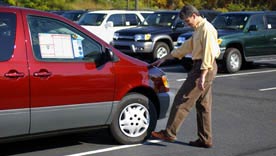Getting top dollar for your used car
By: Jack R. Nerad for Driving Today
Date: 2004-06-28
How much is your time worth? No, this is not a rhetorical question; it is something you should immediately determine if you are considering selling your current vehicle yourself rather than trading it in, especially if you are about to buy a new vehicle.
If you don't figure out what your time is worth, you might well spend costly hour upon hour engaging in amateur salesmanship only to find you would have been better off trading the old boat in to the dealer where you purchased your new car. Or, conversely, you might discover that selling your car yourself is more than worth your while.
So do a little math. What are night and weekend hours (when you'll most likely be collecting most of the phone calls and giving prospective buyers impromptu walk-arounds) worth to you? Only you can determine that figure, but the guess here is it is quite a serious number. Once you've determined that dollar/hour figure, then multiply it by, say, eight hours, as a reasonable estimate of how long it will take you to complete the requisite steps to selling it yourself. Let's assume, for the sake of argument, your weekend hours are worth $50 to you, then selling your car yourself will cost you $400 (8 x $50). But the return from that $400 expenditure of time and effort can be substantial--not enough to buy a second house on a lake but more than just pocket money.
An example
Take this as an example: Your goal is to sell your current 2000 model-year full-size SUV, so you can buy another vehicle. If you trade it in and you are astute about the negotiation process, the dealer will allow you $15,095 as the wholesale value of your SUV. But if you sell the car on the open market, you could well reap $17,395 for the self-same vehicle or (quick, do the math) $2,300 more. So spending eight hours ($400) of your time to collect $2,300 seems like a good investment. Sure, you might further spend $100 or so in newspaper ads, Internet listings and signage, but after accounting for everything--your costs and your time--you still could be up $1,800. Not bad at all.
 So how do you go about maximizing the price you'll get for your car? First, get a good idea what your vehicle is worth at retail. These days, that is simpler than ever, because Web sites like Kelley Blue Book (kbb.com) offer estimated used vehicle pricing (for private party sales and trade-ins) based on your location. (And that is important since vehicle prices differ regionally. For instance, four-wheel-drive vehicles don't sell well in Florida, while big, domestically produced vehicles aren't Californians' cup of tea.) A quick method to test that appraisal is by perusing the newspaper, "shopper," and magazine ads for vehicles very similar to yours. This will help you "ballpark" the price you should charge for your vehicle.
So how do you go about maximizing the price you'll get for your car? First, get a good idea what your vehicle is worth at retail. These days, that is simpler than ever, because Web sites like Kelley Blue Book (kbb.com) offer estimated used vehicle pricing (for private party sales and trade-ins) based on your location. (And that is important since vehicle prices differ regionally. For instance, four-wheel-drive vehicles don't sell well in Florida, while big, domestically produced vehicles aren't Californians' cup of tea.) A quick method to test that appraisal is by perusing the newspaper, "shopper," and magazine ads for vehicles very similar to yours. This will help you "ballpark" the price you should charge for your vehicle.
The next step is to take care of cosmetics. Would you go into a store and buy a dirty shirt or a scratched dining room table? No? Then you'll understand why making certain your vehicle looks as good as it can is a key to getting top dollar for it. So wash the vehicle inside and out until it sparkles.
Mechanics
Of course, making certain the vehicle is in good running condition is also important. Major squeaks, rattles and leaks can put the damper on a lofty sales price. But it is not imperative, as you might think at first blush, that the vehicle be mechanically perfect. Rather than paying top-dollar to get your vehicle totally renovated, you might well be better off simply to point out its shortcomings to potential buyers. As long as those mechanical maladies don't make the vehicle unsafe or undrivable, and as long as you make monetary allowances for them, you could well find that would-be buyers will talk themselves into believing they are getting a good deal.
Obviously, any documentation you possess that will indicate that the car has been well maintained is helpful in backing your case for a higher price for your car. Therefore, repair and maintenance receipts and records are worth hanging on to.
Then, with good doses of honesty and salesmanship, you will be able to negotiate a sales price that will be significantly above your bogey--the trade-in value plus the value of your time in selling the vehicle. So, while selling a vehicle yourself isn't as simple as driving it up to a dealer, tossing him the keys, and shouting, "What will you give me for it?" the process isn't, as they say, rocket surgery. In fact, even I have done it.
Driving Today Managing Editor Jack R. Nerad is the author of The Complete Idiot's Guide to Buying or Leasing a Car.
Comments to this article have been disabled.
